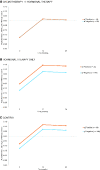Protective Effects of APOE ε2 Genotype on Cognition in Older Breast Cancer Survivors: The Thinking and Living With Cancer Study
- PMID: 33748669
- PMCID: PMC7962698
- DOI: 10.1093/jncics/pkab013
Protective Effects of APOE ε2 Genotype on Cognition in Older Breast Cancer Survivors: The Thinking and Living With Cancer Study
Abstract
Background: Cancer-related cognitive decline (CRCD) has been linked to apolipoprotein E (APOE) gene ε4 polymorphisms. APOE ε4 polymorphisms are also the strongest genetic risk for late-onset Alzheimer disease (AD), whereas ε2 polymorphisms protect against AD. However, the effects of ε2 polymorphisms on CRCD have not been evaluated.
Methods: We evaluated nonmetastatic breast cancer survivors (n = 427) and matched noncancer controls (n = 407) ages 60-98 years assessed presystemic therapy from August 2010 to December 2017 with annual follow-up to 24 months. Neuropsychological assessment measured attention, processing speed, executive function, and learning and memory. Linear mixed-effects models tested the effects of having an ε2 allele (vs none) on longitudinal cognitive domain z scores by treatment group (chemotherapy with or without hormonal therapy, hormonal therapy, and control) controlling for covariates; participants with ε2/ε4 genotype were excluded. Sensitivity analyses examined effects of other covariates and any ε4 positivity.
Results: There was an interaction with genotype for attention, processing speed, and executive functioning domain scores (Beta = 0.32, 95% confidence interval = 0.00 to 0.65); the chemotherapy group with an ε2 allele had higher scores at baseline and maintained higher scores over time compared with those without an ε2 allele, and this protective effect was not seen for other groups. There was no effect of ε2 on learning and memory domain scores.
Conclusions: APOE ε2 polymorphisms may protect against CRCD in older breast cancer survivors receiving chemotherapy. With replication, this information could be useful for survivorship care and informing future studies of possible links to AD and defining mechanisms of protection.
© The Author(s) 2021. Published by Oxford University Press.
Figures



Similar articles
-
Alzheimer's disease genetic risk and cognitive reserve in relationship to long-term cognitive trajectories among cognitively normal individuals.Alzheimers Res Ther. 2023 Mar 28;15(1):66. doi: 10.1186/s13195-023-01206-9. Alzheimers Res Ther. 2023. PMID: 36978190 Free PMC article.
-
Association Between Apolipoprotein E ε2 vs ε4, Age, and β-Amyloid in Adults Without Cognitive Impairment.JAMA Neurol. 2021 Feb 1;78(2):229-235. doi: 10.1001/jamaneurol.2020.3780. JAMA Neurol. 2021. PMID: 33044487 Free PMC article. Clinical Trial.
-
Impact of APOE ε4 and ε2 on plasma neurofilament light chain and cognition in autosomal dominant Alzheimer's disease.Alzheimers Res Ther. 2024 Oct 1;16(1):208. doi: 10.1186/s13195-024-01572-y. Alzheimers Res Ther. 2024. PMID: 39354618 Free PMC article.
-
Association of apolipoprotein E genetic variation in Alzheimer's disease in Indian population: a meta-analysis.Am J Alzheimers Dis Other Demen. 2014 Nov;29(7):575-82. doi: 10.1177/1533317514531443. Am J Alzheimers Dis Other Demen. 2014. PMID: 25551132 Free PMC article. Review.
-
Beneficial Effect of Societal Factors on APOE-ε2 and ε4 Carriers' Brain Health: A Systematic Review.J Gerontol A Biol Sci Med Sci. 2024 Feb 1;79(2):glad237. doi: 10.1093/gerona/glad237. J Gerontol A Biol Sci Med Sci. 2024. PMID: 37792627 Free PMC article.
Cited by
-
Association of markers of tumor aggressivity and cognition in women with breast cancer before adjuvant treatment: The Thinking and Living with Cancer Study.Breast Cancer Res Treat. 2022 Jul;194(2):413-422. doi: 10.1007/s10549-022-06623-2. Epub 2022 May 19. Breast Cancer Res Treat. 2022. PMID: 35587324 Free PMC article.
-
Genetic Variants Associated with Longitudinal Cognitive Performance in Older Breast Cancer Patients and Controls.Cancers (Basel). 2023 May 23;15(11):2877. doi: 10.3390/cancers15112877. Cancers (Basel). 2023. PMID: 37296840 Free PMC article.
-
A scoping review of cognitive assessment tools and domains for chemotherapy-induced cognitive impairments in cancer survivors.Front Hum Neurosci. 2023 Feb 20;17:1063674. doi: 10.3389/fnhum.2023.1063674. eCollection 2023. Front Hum Neurosci. 2023. PMID: 36891148 Free PMC article.
-
Alpha-2-Heremans-Schmid-glycoprotein (AHSG) a potential biomarker associated with prognosis of chromophobe renal cell carcinoma: The PROPOLIS study.Health Sci Rep. 2022 Oct 17;5(6):e878. doi: 10.1002/hsr2.878. eCollection 2022 Nov. Health Sci Rep. 2022. PMID: 36262809 Free PMC article.
-
A scoping review evaluating physical and cognitive functional outcomes in cancer survivors treated with chemotherapy: charting progress since the 2018 NCI think tank on cancer and aging phenotypes.J Cancer Surviv. 2024 Aug;18(4):1089-1130. doi: 10.1007/s11764-024-01589-0. Epub 2024 May 14. J Cancer Surviv. 2024. PMID: 38743185 Free PMC article.
References
-
- Koppelmans V, Breteler MMB, Boogerd W, Seynaeve C, Gundy C, Schagen SB.. Neuropsychological performance in survivors of breast cancer more than 20 years after adjuvant chemotherapy. J Clin Oncol. 2012;30(10):1080–1086. - PubMed
Publication types
MeSH terms
Substances
Grants and funding
- R01 CA237535/CA/NCI NIH HHS/United States
- U24 NS095871/NS/NINDS NIH HHS/United States
- R01 LM011360/LM/NLM NIH HHS/United States
- U01 AG024904/AG/NIA NIH HHS/United States
- P30 CA008748/CA/NCI NIH HHS/United States
- P30 CA082709/CA/NCI NIH HHS/United States
- R01 CA129769/CA/NCI NIH HHS/United States
- EP-D-17-023/EPA/EPA/United States
- U54 CA137788/CA/NCI NIH HHS/United States
- EP-C-17-023/EPA/EPA/United States
- P30 AG010133/AG/NIA NIH HHS/United States
- U24 AG021886/AG/NIA NIH HHS/United States
- R01 CA172119/CA/NCI NIH HHS/United States
- R01 CA244673/CA/NCI NIH HHS/United States
- K08 CA241337/CA/NCI NIH HHS/United States
- U01 AG057195/AG/NIA NIH HHS/United States
- U54 CA132378/CA/NCI NIH HHS/United States
- P30 CA051008/CA/NCI NIH HHS/United States
- R01 AG019771/AG/NIA NIH HHS/United States
- R01 AG068193/AG/NIA NIH HHS/United States
- P30 AG028716/AG/NIA NIH HHS/United States
- R01 AG067258/AG/NIA NIH HHS/United States
- R35 CA197289/CA/NCI NIH HHS/United States
LinkOut - more resources
Full Text Sources
Other Literature Sources
Medical
Miscellaneous
